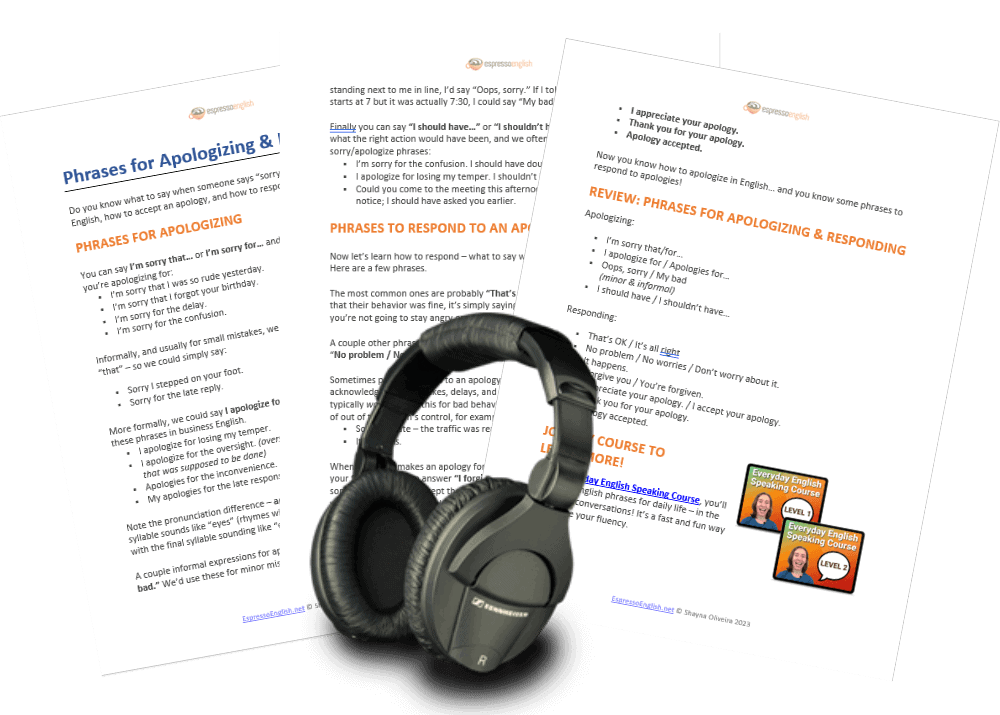
Do you know what to say when someone says “sorry”? Learn how to apologize in English, how to accept an apology, and how to respond to “I’m sorry.”
English Phrases for Apologizing
You can say I’m sorry that… or I’m sorry for… and then say specifically what you’re apologizing for:
- I’m sorry that I was so rude yesterday.
- I’m sorry that I forgot your birthday.
- I’m sorry for the delay.
- I’m sorry for the confusion.
Informally, and usually for small mistakes, we sometimes eliminate “I’m” and “that” – so we could simply say:
- Sorry I stepped on your foot.
- Sorry for the late reply.

More formally, we could say I apologize for… or Apologies for… – we often see these phrases in business English.
- I apologize for losing my temper.
- I apologize for the oversight.
(oversight = forgetting or not doing something that was supposed to be done) - Apologies for the inconvenience.
- My apologies for the late response.
Note the pronunciation difference – apologize is the verb form, and the final syllable sounds like “eyes” (rhymes with “prize”) and apologies is the noun form, with the final syllable sounding like “ease” (rhymes with “bees”).
A couple informal expressions for apologizing are “Oops, sorry” and “My bad.” We’d use these for minor mistakes, like if I accidentally bump someone standing next to me in line, I’d say “Oops, sorry.” If I told a friend that an event starts at 7 but it was actually 7:30, I could say “My bad,” meaning “My mistake.”
Finally you can say “I should have…” or “I shouldn’t have…” – these phrases tell what the right action would have been, and we often use them after one of the sorry/apologize phrases:
- I’m sorry for the confusion. I should have double-checked the information.
- I apologize for losing my temper. I shouldn’t have yelled at you.
- Could you come to the meeting this afternoon? My apologies for the short notice; I should have asked you earlier.
English Phrases to Respond to an Apology
Now let’s learn how to respond – what to say when someone else apologizes. Here are a few phrases.
The most common ones are probably “That’s OK / It’s all right.” This is not saying that their behavior was fine, it’s simply saying that you accept their apology and you’re not going to stay angry or upset.
A couple other phrases for responding to an apology, with the same meaning, are “No problem / No worries” and “Don’t worry about it.”
Sometimes people respond to an apology with the phrase “It happens” – this acknowledges that mistakes, delays, and accidents are simply part of life. We typically wouldn’t use this for bad behavior, but instead something that was kind of out of the person’s control, for example:
- Sorry I’m late – the traffic was really bad.
- It happens.
When someone makes an apology for something more serious that really did hurt your feelings, you can answer “I forgive you” or “You’re forgiven” – to forgive someone means you accept the apology and you will not hold a grudge, meaning you won’t continue to hold on to your anger or bad feelings against the person.
In a business English or professional context, we can use these slightly more formal phrases to respond to an apology:
- I appreciate your apology.
- Thank you for your apology.
- Apology accepted.
Now you know how to apologize in English… and you know some phrases to respond to apologies!

Review: Phrases for apologizing and responding to an apology
Apologizing:
- I’m sorry that/for…
- I apologize for / Apologies for…
- Oops, sorry / My bad
(minor & informal) - I should have / I shouldn’t have…
Responding:
- That’s OK / It’s all right
- No problem / No worries / Don’t worry about it.
- It happens.
- I forgive you / You’re forgiven.
- I appreciate your apology. / I accept your apology.
- Thank you for your apology.
- Apology accepted.
Learn more:



